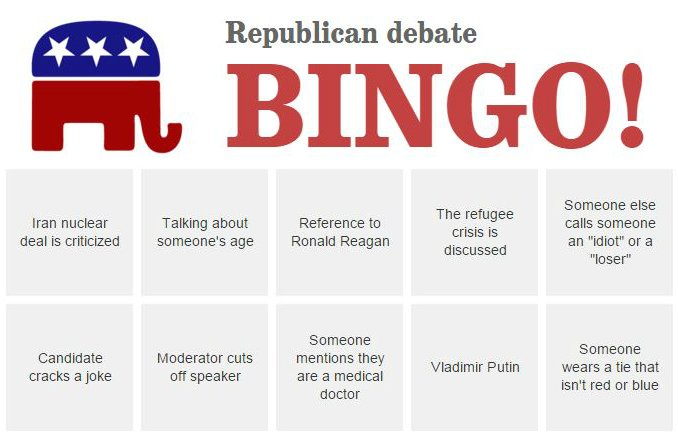GOP debate blow-by-blow: How it all played out
By the numbers
The top Republican candidates debated for the third time in Boulder, Colo., on Wednesday evening. Some candidates did well -- New Jersey Gov. Chris Christie and Florida Sen. Marco Rubio -- and some fared poorly, like former Florida Gov. Jeb Bush . But it's not likely any of the moments changed the trajectory of the campaign. Analysis, fact checks and tidbits:
- Our summary of the debate
- Compare the GOP candidates
Some takeaways from the debate
While some candidates did well in Wednesday’s debate, like New Jersey Gov. Chris Christie and Florida Sen. Marco Rubio, and some fared poorly – former Florida Gov. Jeb Bush – it's not likely any of the moments changed the trajectory of the campaign. A few takeaways:
> Blame the media.
Attacking the questioner is a long-standing get-out-of jail device in debates – particularly on the Republican side, where resentment of the "liberal" media is a perennial grievance.
> Florida’s favorite sons, Rubio and Bush, are no longer brothers.
Bush’s campaign is struggling as insiders begin to see Rubio as the stronger mainstream candidate. And that tension became very public when Bush criticized Rubio’s poor attendance record in the Senate.
> Where did Bush go?
Bush was once again under pressure to show up big and he didn’t. He failed to speak often or memorably.
> The Republican Party has real differences over entitlements.
Christie and Mike Huckabee, the former Arkansas governor, essentially agreed as Christie said that “the government has lied to you, and they have stolen from you” by spending the surplus in the Social Security trust fund.
But they disagreed sharply on what to do about that.
McManus: The clock tells the story
Marco Rubio shone, and so did Carly Fiorina. Jeb Bush struggled to get a word in edgewise. Donald Trump groused that the moderators were too harsh. But Ben Carson had no complaints; he praised his opponents for observing Ronald Reagan’s eleventh commandment -- avoiding criticism of fellow Republicans.
If conservatives were hoping for a moment of illuminating clarity from Wednesday’s debate among the GOP presidential candidates on CNBC, they didn’t get it. The two-hour debate had the peculiar effect of diminishing candidates who once appeared to be front-runners – Bush and Trump – but elevating others: Rubio, Fiorina, even Chris Christie.
This debate seems to have widened the field
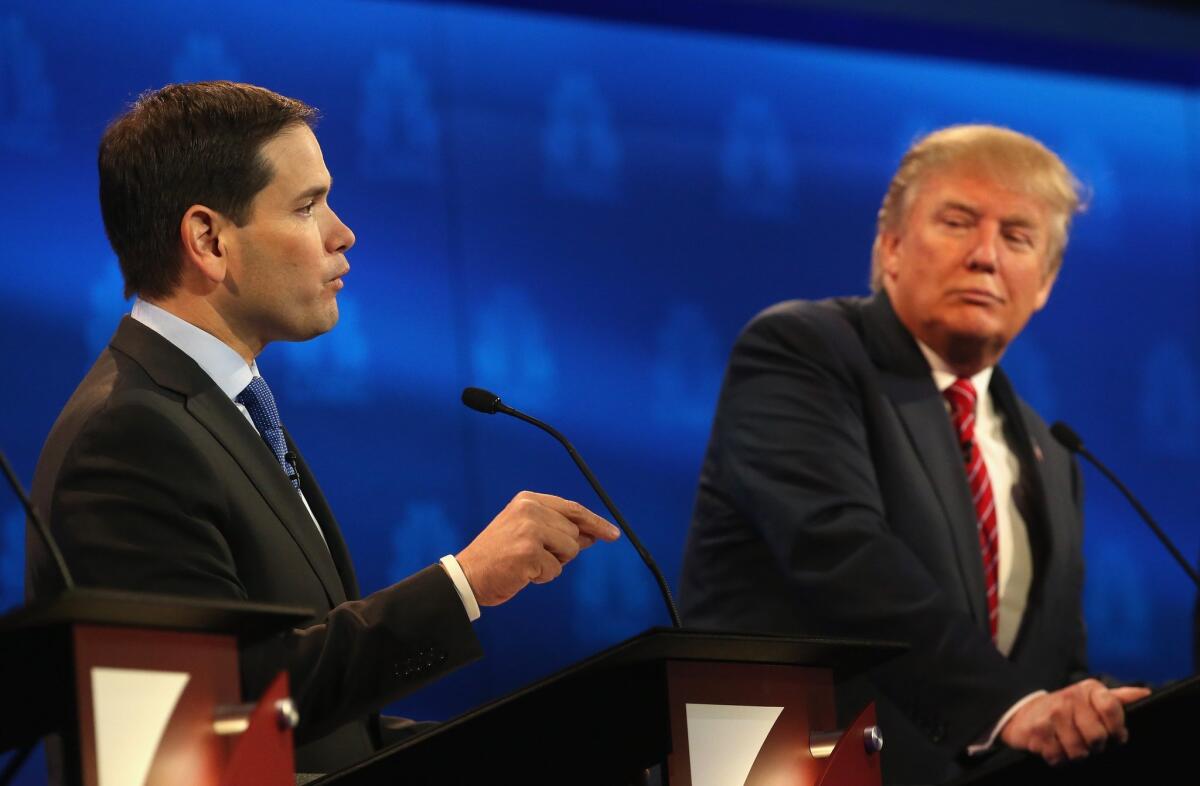
Republican presidential hopeful Sen. Marco Rubio of Florida speaks while Donald Trump looks on during the Republican debate Wednesday night. Rubio’s strong performance seems likely to boost his standing in the GOP field.
The third Republican presidential debate was supposed to be one that winnowed the field. Instead, it is likely to revive several faltering candidates, while harming only one -- former front-runner Jeb Bush.
The fight was expected to be between Donald Trump and the man who only recently leapfrogged him in national and Iowa polls -- retired neurosurgeon Ben Carson. But those two were bit players for most of the evening. Oddly, perhaps, neither Trump’s business background nor the CEO experience of Carly Fiorina let them dominate a debate focused sharply on the economy and budgetary matters.
A lot more speaking time for non-Trump candidates
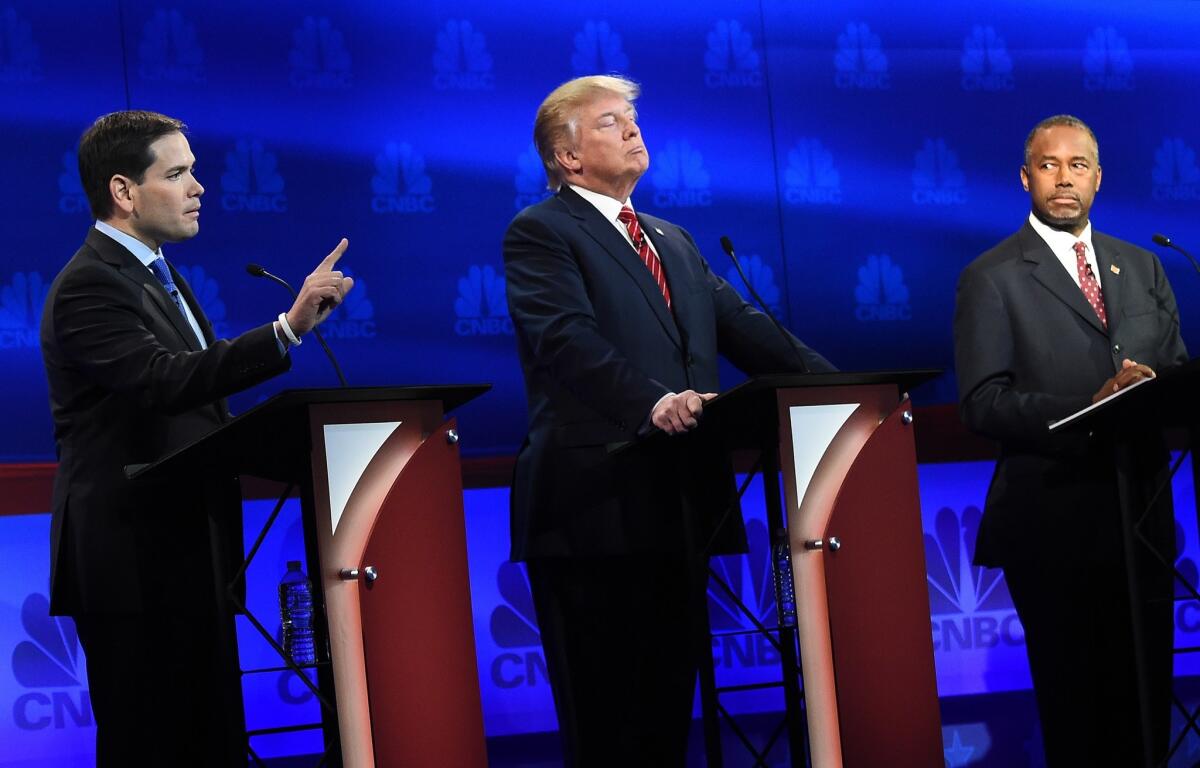
Republican Presidential hopeful Marco Rubio (L) speaks as Donald Trump (C) and Ben Carson look on during the CNBC Republican Presidential Debate at the Coors Event Center at the University of Colorado in Boulder, Colo.
Donald Trump was near the middle of the pack in terms of how much airtime he got tonight, which is surprising for anyone who watched the first two debates.
In the final tally , Trump spoke for 9 minutes, 22 seconds, behind Carly Fiorina, who got 10:32 of airtime, and Sen. Marco Rubio, who spoke for 10:10. Ohio Gov. John Kasich edged in 9:42 of screen time.
Trump dominated the clock in the first two debates. He spoke for 10:30 in the opening showdown , a full two minutes more than Jeb Bush, who came in second.
And in the second debate, which was held Sept. 16 in Simi Valley and lasted three hours, Trump got in 18:47 of airtime, three minutes more than runner-up Bush.
Chris Christie, etiquette coach
Back in New Jersey, Gov. Chris Christie is well known for his mockery and taunts. One of his first viral moments was calling a columnist “thin-skinned,” and he once referred to a state lawmaker as “numb nuts.”
The news website NJ.com even created an "insult generator" to catalog Christie’s quips and takedowns.
But Christie was a little more delicate during Wednesday night's debate when one of the CNBC moderators tried to interject while he was answering a question.
“Even in New Jersey, what you’re doing is called rude,” he said.
The comment was apparently a hit with viewers – Republican pollster Frank Luntz said his focus group loved it.
Christie has been trailing in the polls, leaving some to wonder whether he needed a strong performance to get his campaign on track. When it was over, he seemed happy with how it all turned out for him.
Long-brewing confrontation between Bush and Rubio emerges during debate
A confrontation has long been brewing between Floridian allies-turned-rivals Jeb Bush and Marco Rubio.
When they launched their presidential campaigns this year, the men were laudatory of each other. But as Bush’s campaign has faltered and Rubio strives to replace him as the establishment GOP choice, their detente has given way to veiled slights.
During Wednesday night’s debate, any subtlety evaporated, as the two men confronted each other directly for the first time. Bush scolded Rubio for failing to do his job as a U.S. senator, and Rubio accusing Bush of attacking him out of desperation.
A CNBC moderator asked Rubio about the Sun-Sentinel newspaper editorial board’s call for him to resign for missing votes in the Senate to campaign and raise money.
Rubio countered that the paper did not similarly call on past Democratic senators running for president to resign, and he blamed media bias.
“This is another example of the double standard that exists in this country between the mainstream media and the conservative movement,” Rubio said, drawing sustained applause from the debate audience of more than 1,000 people in Boulder, Colo.
Bush, a former Florida governor, interjected that the Sun-Sentinel had endorsed Rubio’s Senate campaign.
“Marco, when you signed up for this, this was a six-year term and you should be showing up to work,” Bush said. “I mean literally, the Senate, what is it, like a French workweek? You get like three days where you have to show. You can campaign. Or just resign and let someone else take the job.”
Rubio shot back that Bush had not similarly criticized Sen. John McCain’s missed votes when he was the party’s 2008 nominee for president.
“The only reason that you’re doing it now is because we’re running for the same position and someone has convinced you that attacking me is going to help you,” Rubio said.
Nearing the end, here's the speaking time power rankings
The media, according to GOP candidates: biased, rude
Attacks on the media are continuing, with candidates seem determined to get off at least one shot at the media.
The latest one to point fingers at journalists is New Jersey Gov. Chris Christie, who objected to being interrupted.
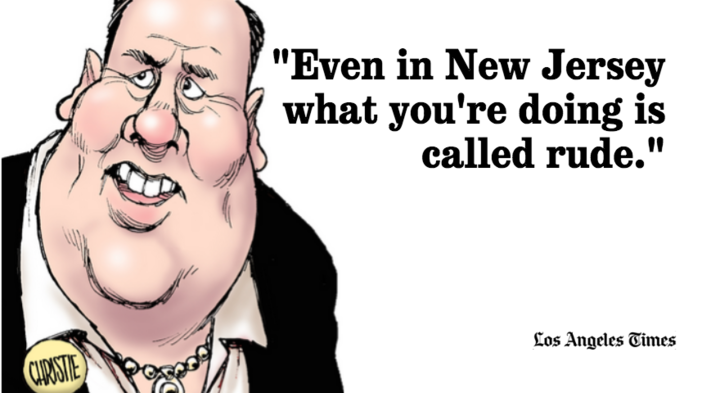
The comment was a hit, according to Republican pollster Frank Luntz.
Earlier in the evening, Sen. Ted Cruz called out CNBC moderators for what he said was the tone of their questions, saying, "This is not a cage match."
Florida Sen. Marco Rubio then called the media the Democrats' "ultimate super PAC" and accused them of going easy on Hillary Clinton when she testified to the House Select Committee on Benghazi.
Why Obamacare is not a 'job-killer'
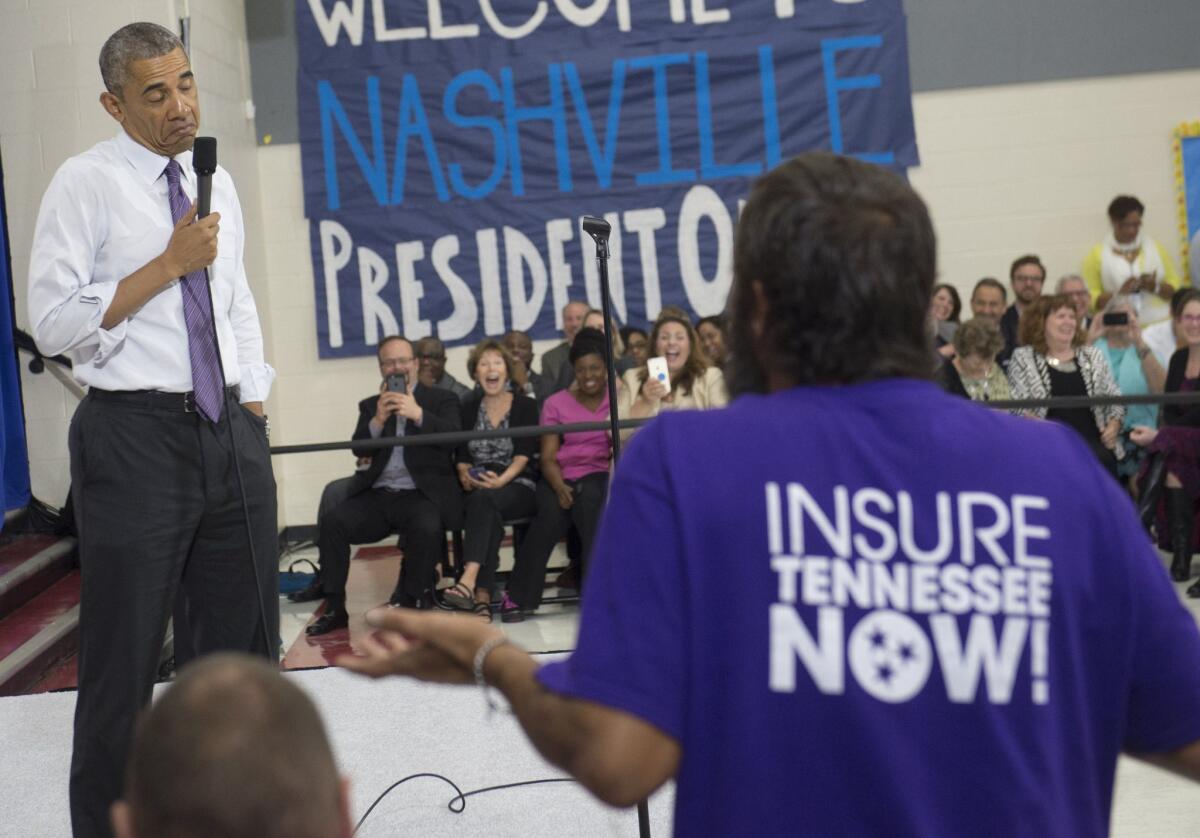
President Obama takes a question about the Affordable Care Act at a Tennessee forum in July.
Carly Fiorina took aim at the Affordable Care Act in Wednesday’s debate, saying it’s been hurting American businesses.
Her comments echo other criticisms from Republicans, who have been warning for more than five years that President Obama’s healthcare law would wreck the economy and destroy jobs.
There has been little evidence this is happening.
In fact, the private sector has added jobs every month since Obama signed the law in March 2010, a stark reversal from the months before the law was enacted when the economy was hemorrhaging jobs.
It is impossible to say definitively whether Obamacare has played any part in the turnaround, but the jobs data undermine critics’ claims that the healthcare law is a “job-killer.”
The GOP claim has been based in part on projections by the nonpartisan Congressional Budget Office, which has estimated that the law would reduce the size of the workforce as Americans who once had to work to get coverage may quit or scale back their hours since they can now get insurance through the health law even if they are unemployed.
Last year, the budget office estimated the workforce would shrink by the equivalent of about 2.5 million full-time positions by 2024.
That may yet happen, though supporters of the law counter that it allows people who want to retire or leave their jobs to start new businesses because they no longer have to worry about insurance.
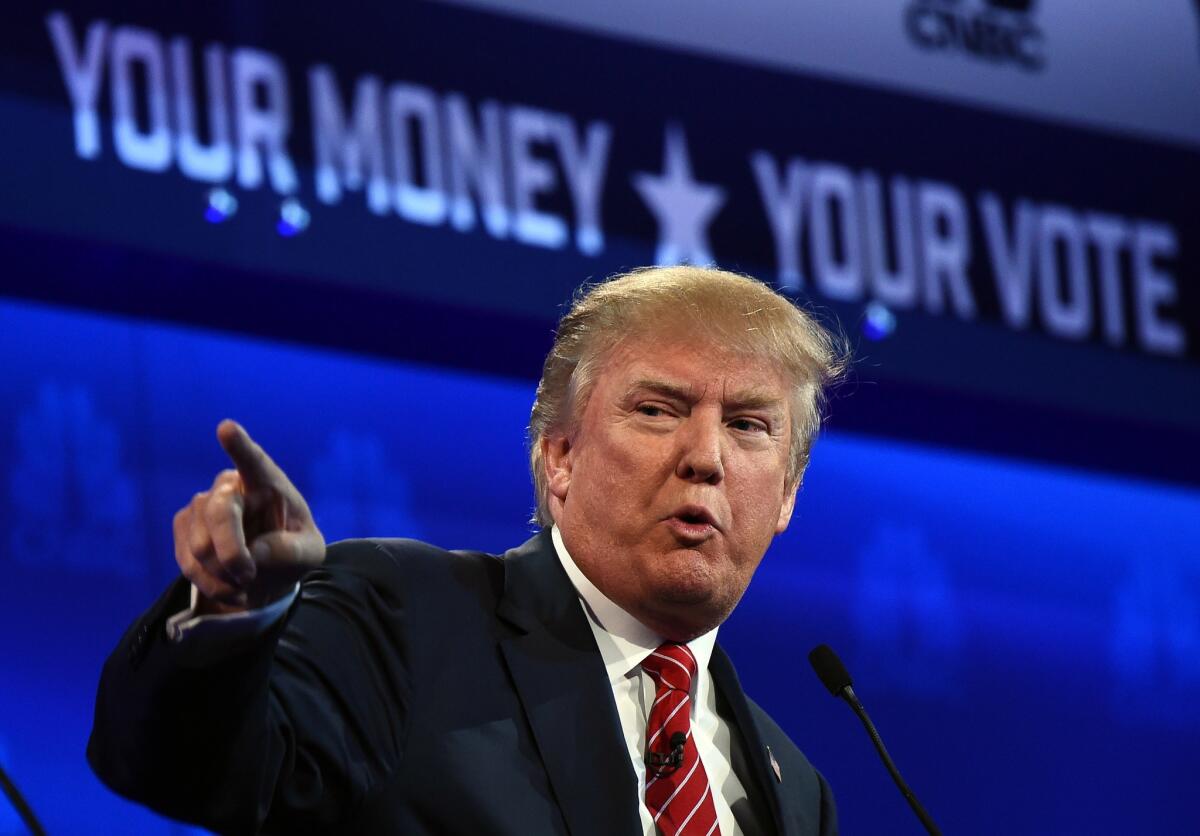
Republican Presidential hopeful Donald Trump speaks during the CNBC Republican Presidential Debate at the Coors Event Center at the University of Colorado in Boulder, Colo.
Pot brings tax revenue, but not crime, to Colorado

With tonight’s debate taking place in Colorado, one of the only states with legal recreational marijuana, the topic of pot was bound to come up.
Ohio Gov. John Kasich said he didn’t like the policy.
“Sending mixed signals to kids about drugs is a disaster,” he said.
Colorado legalized marijuana in 2012, and the initiative garnered more support -- 55% of voters -- than President Obama, who won the swing state with 51% of the votes. And on Wednesday, Vermont Sen. Bernie Sanders, who is vying for the Democratic presidential nomination, announced his support for the legalization of marijuana.
Colorado’s implementation of the regulations governing legal marijuana has had some bumps, but the way some law-and-order Republicans -- such as New Jersey Gov. Chris Christie -- describe legalized pot as increasing violent crime is not the case in Colorado.
Still, some neighboring states, such as Nebraska and Oklahoma , have criticized Colorado’s pot laws, saying crime has increased as a result in their states.
Oklahoma's Bureau of Narcotics and Dangerous Drugs said it had seen more "high-potency" marijuana arriving from its neighbor. Mark Woodward, an agency spokesman, told The Times this year there had been about a dozen cases in 2014.
"Whether it's people driving to Colorado and bringing it back, or mailing it through the postal service, it's getting here," he said. "This is marijuana with very high concentrations of THC, very strong stuff."
In Colorado, though, no increase in crime is reflected in statistics. A report from the Drug Policy Alliance found that violent crime and property crime decreased in 2014 in Denver. Moreover, the same report found in that same time frame traffic fatalities dropped 3% in the state.
Legal marijuana has become a boost to the state through tax revenue and tourism. In September, the state brought in $13 million in tax revenue from medicinal and recreational marijuana. Of that, $3 million went to school construction, according to the Colorado Department of Revenue, per state law.
“It’s not hurting Coloradans,” said Mason Tvert, spokesman for the Marijuana Policy Project, a nonprofit that advocates for pot reform. “People should come to Colorado and check it out.”
Huckabee turns runaway blimp into a metaphor
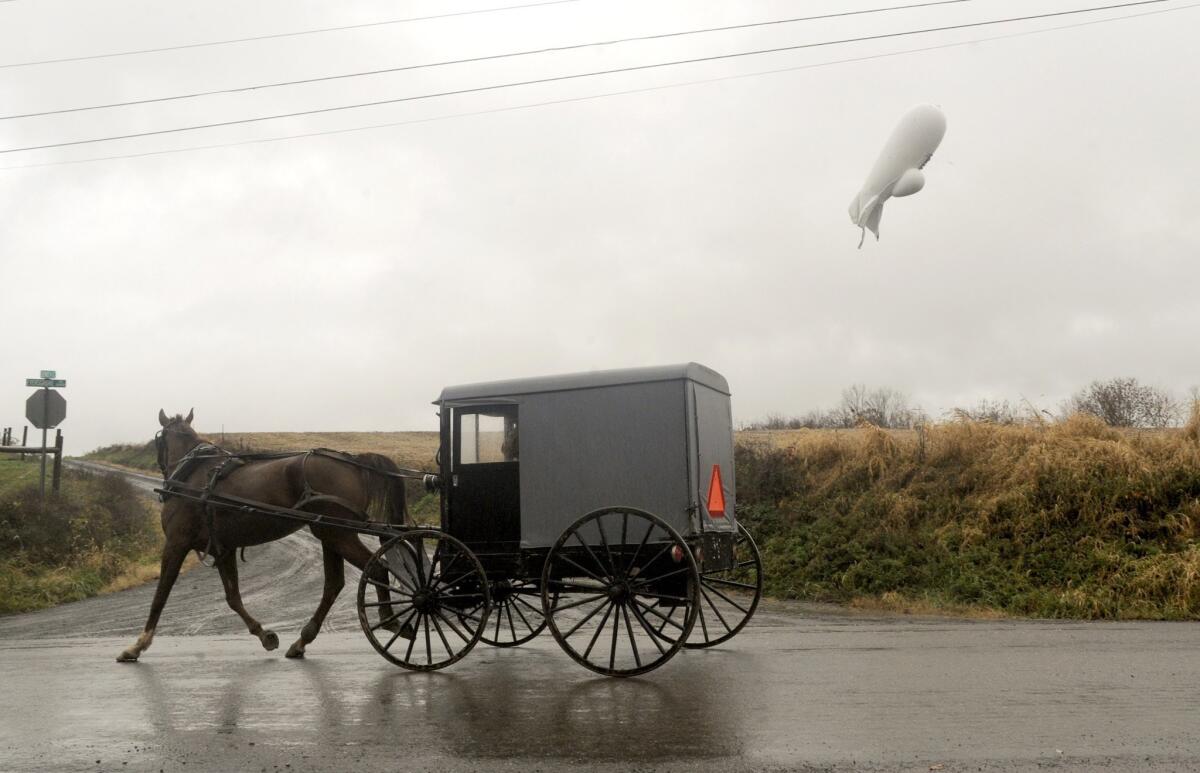
An unmanned Army surveillance blimp floats through the air while dragging a tether line just south of Millville, Pa., on Oct. 28.
Mike Huckabee had a new metaphor for out-of-control government during tonight’s debate – the military blimp that mistakenly floated away over Pennsylvania before crashing to the ground.
He described the blimp as full of hot air, but costing too much money to abandon.
The blimp is actually part of a $2.7-billion air-defense program that David Willman has investigated for the Los Angeles Times.
One candidate who’s getting a lot of air time tonight: Hillary Clinton
The candidates on the Republican debate stage tried various different lines of attack to stand out. Ted Cruz attacked the media. Jeb Bush and Marco Rubio attacked each other. Donald Trump attacked the idea that his bankruptcies reflect poorly on his financial acumen.
But many of the candidates are – predictably – attacking Hillary Rodham Clinton.
New Jersey Gov. Chris Christie said that when he looks at the Democratic contenders, “I see a socialist, an isolationist and a pessimist. And for the sake of me, I can't figure out which one is which.”
“You put me on that stage against her next September, she won't get within 10 miles of the White House,” Christie vowed. “Take it to the bank.”
Marco Rubio accused the media of colluding with Clinton. “She has a super PAC helping her out: the American mainstream media,” he said.
When the topic of price-gouging by pharmaceutical firms came up, conversation again turned to Clinton, who is proposing regulations that would ban it. Christie warned that such regulations would be disastrous and only hurt consumers.
The Republicans also used the debate as a platform to attack Clinton’s plans to promote equal pay for men and women. Ted Cruz said that more than 3 million women had fallen into poverty in the Obama administration, in which Clinton served as secretary of State. Carly Fiorina expanded on the point.
“It is the height of hypocrisy,” she said of Clinton’s plans for pay equality. “Every single policy she espouses … has been demonstrably bad for women.”
Clinton seemed to be watching it all with some amusement. As the Republicans attacked, her campaign texted notes to reporters signed with Clinton’s first initial.
Said one: “Still haven’t heard a single idea to close the wage gap & make sure women are paid equally. –H”
Did Donald Trump criticize Mark Zuckerberg or not?
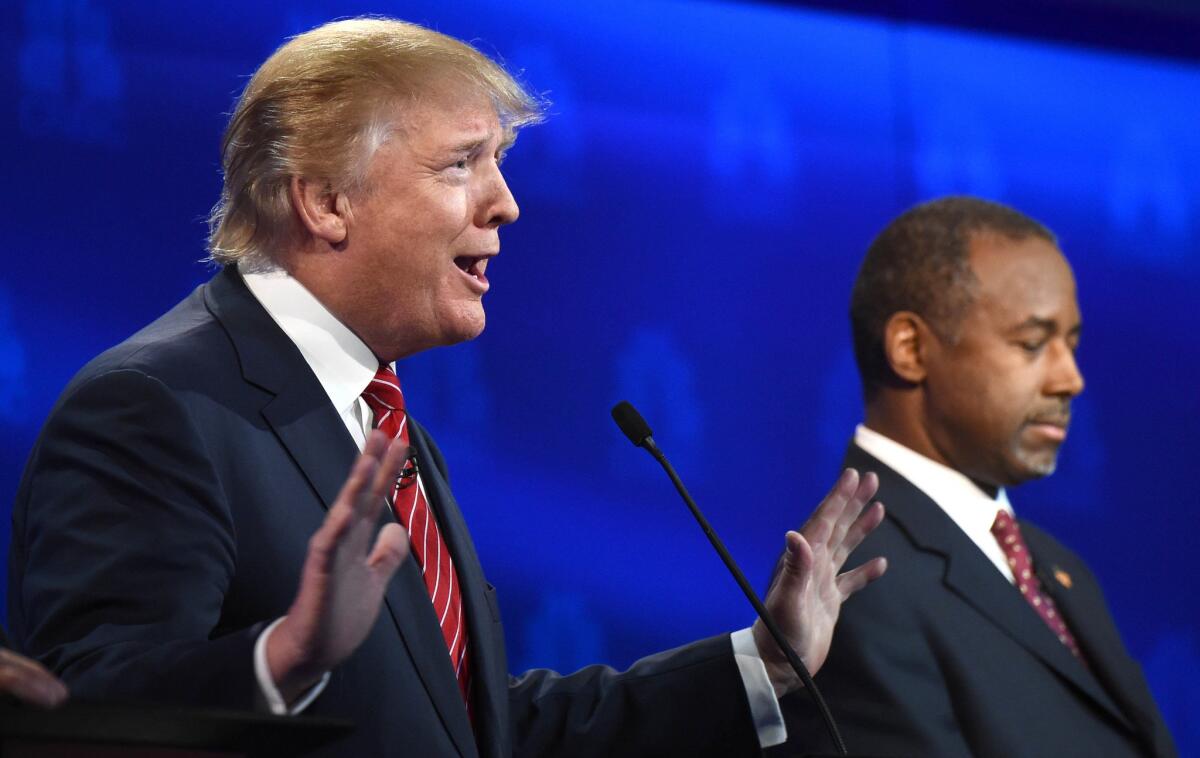
Republican presidential hopeful Donald Trump speaks as Ben Carson look on during the CNBC Republican Presidential Debate at the Coors Event Center at the University of Colorado in Boulder, Color.
Donald Trump denied having criticized Facebook founder Mark Zuckerberg over immigration, telling the moderator he didn’t know where the media got that idea.
Well, the idea may have come from the immigration plan posted on Trump’s own website, in which he mentioned Zuckerberg while taking a swipe at fellow candidate Marco Rubio.
Trump’s plan includes raising wages paid to people who are in the country on H1-B visas, which permit foreigners with specialty skills fill job vacancies left by a domestic skills gap.
“This will improve the number of black, Hispanic and female workers in Silicon Valley who have been passed over in favor of the H-1B program. Mark Zuckerberg’s personal Senator, Marco Rubio, has a bill to triple H-1Bs that would decimate women and minorities,” Trump’s website says.
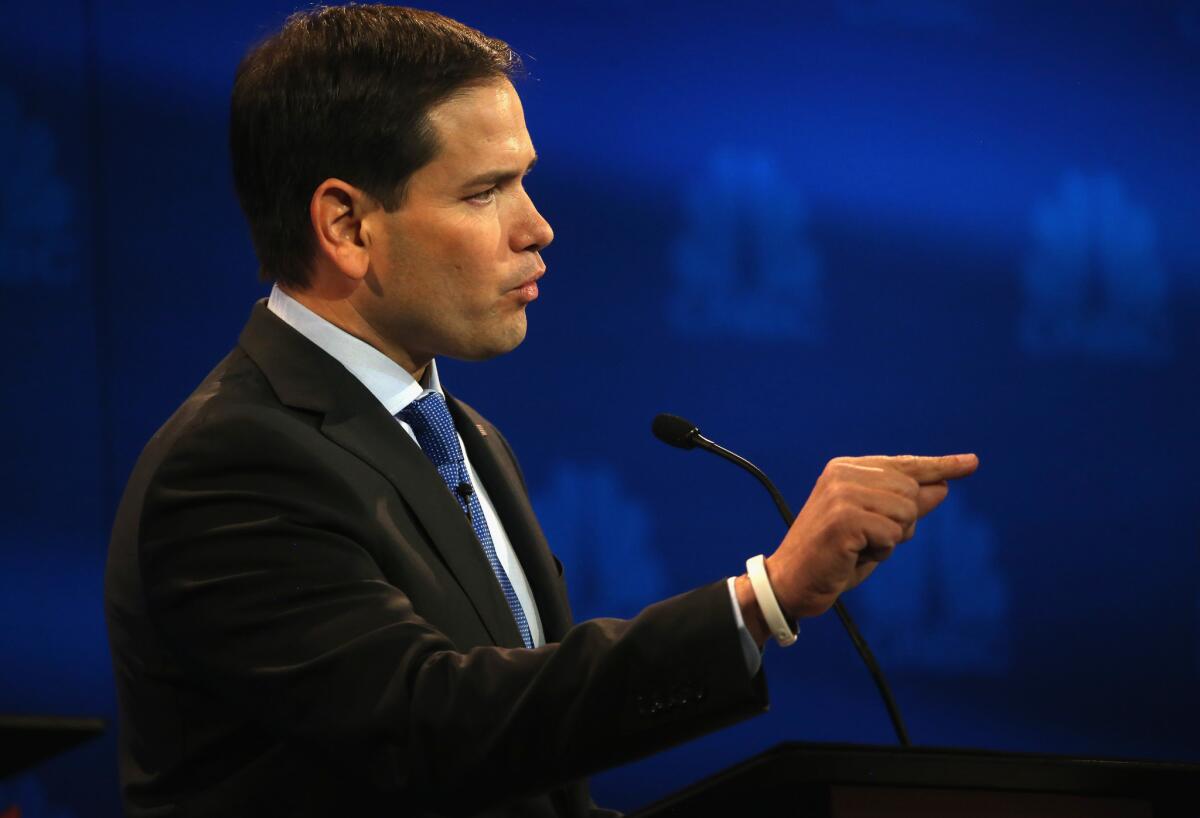
BOULDER, CO - OCTOBER 28: Presidential candidates Sen. Marco Rubio (R-FL) speaks during the CNBC Republican Presidential Debate at University of Colorados Coors Events Center October 28, 2015 in Boulder, Colorado. Fourteen Republican presidential candidates are participating in the third set of Republican presidential debates. (Photo by Justin Sullivan/Getty Images) ** OUTS - ELSENT, FPG, CM - OUTS * NM, PH, VA if sourced by CT, LA or MoD **
Ted Cruz gets personal talking about equal pay for women
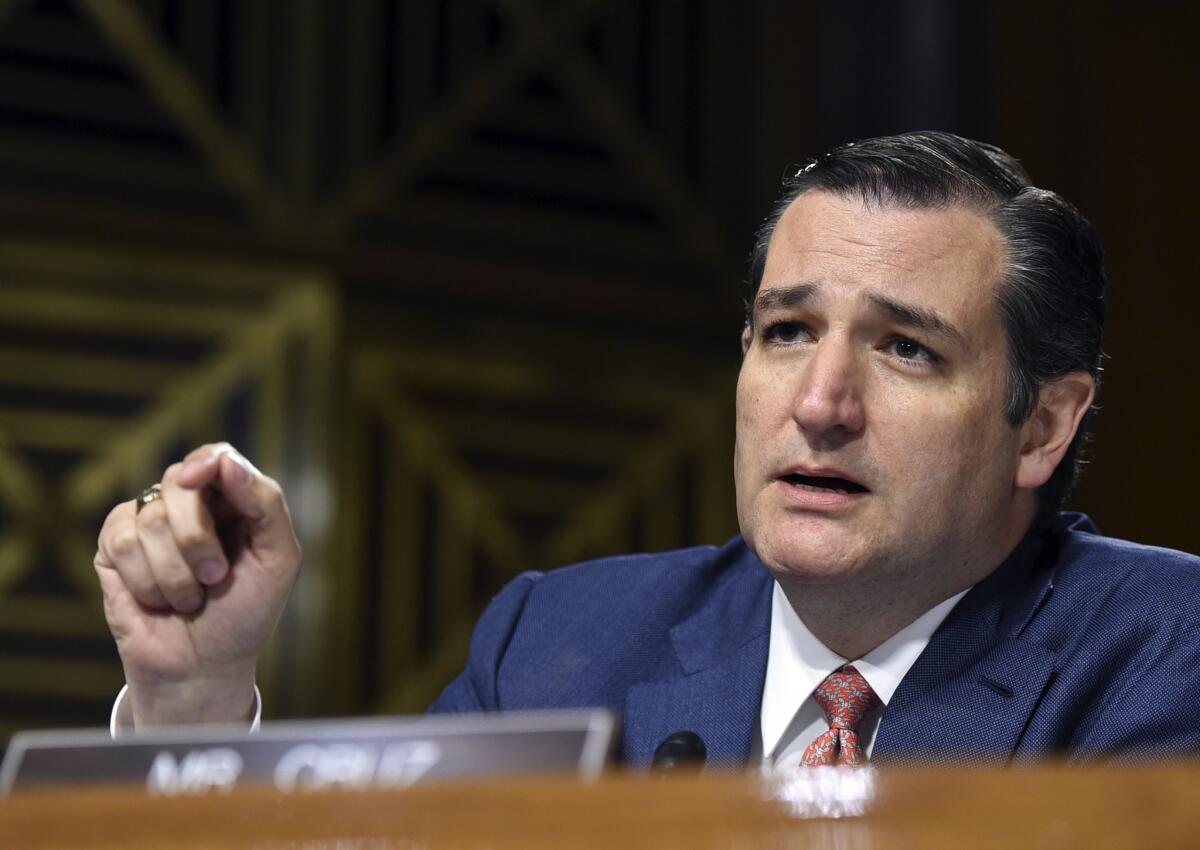
Republican Sen. Ted Cruz of Texas is targeting the Supreme Court for a series of recent rulings that he says shows the need for the justices to be elected, not appointed.
Texas Sen. Ted Cruz has castigated Democrats’ message of equal pay for women in recent weeks as a ploy to get votes.
During Wednesday night’s debate, Cruz did not back down and offered a personal story about him briefly growing up with a single mother.
“We’ve got to turn the economy around for people who are struggling,” he said. “Democrats’ answer to everything is more government control over wages. … You look at working women, I’ll tell you, in my family, there are a lot of single moms.”
Cruz said his sister was a single mother, as were his aunts and, briefly, his mother, until his father came back to the family after finding religion.
“When you see Hillary Clinton and Bernie Sanders and all the Democrats talking about addressing the plight of working women, not one mention under Barack Obama 3.7 million women have entered poverty,” Cruz said.
Democrats have looked to call attention to the pay gap between women and men.
In Obama’s first term, he signed the Lilly Ledbetter Fair Pay Act, which was widely supported by women’s rights groups. And in several new television ads released by Clinton on Wednesday, she addresses the pay gap.
Bernie Madoff's GOP cameo
Former Arkansas Gov. Mike Huckabee offered a spirited defense of Social Security in the Republican debate, chastising those who want to reduce costs by paying benefits only to those whose income falls below an undetermined level. It's the people's money, he said, they paid into Social Security, and anyone who forgets that isn't so different from Bernie Madoff.
Remember Madoff? He ran a successful investment firm for decades, but it turned out to be a Ponzi scheme. Benefits were paid by drawing in new investors, not by investing well.
Madoff was convicted of fraud and is serving a 150-year prison term. Billions of investors' dollars vanished.
Speaking of talking, here's a time tally
Trump sees the upside to bankruptcies
Donald Trump, not talking

Republican Presidential hopeful Marco Rubio (L) speaks as Donald Trump (C) and Ben Carson look on during the CNBC Republican Presidential Debate at the Coors Event Center at the University of Colorado in Boulder, Colo.
Cruz and Rubio take aim at the media
Texas Sen. Ted Cruz criticized what he called the mainstream media's bias in portraying the GOP candidates.
"This is not a cage match," Cruz said to applause. "How about talking about the substantive issues people care about."
He went on to say moderators had asked "fawning questions" of Democratic candidates.
Sen. Marco Rubio, under fire for his voting record in the Senate, blamed what he also called bias from the mainstream media. He pointed to John Kerry and President Barack Obama, who he said were not asked to resign their Senate seats even as they missed votes to campaign for president.
Debate moderators challenge Trump, Carson on their tax plan math
Front-runners Donald Trump and Ben Carson were immediately put on the defensive in Wednesday night’s debate, with moderators questioning whether their budget plans come close to penciling out.
“Is this the comic book version of a presidential campaign?” CNBC moderator John Harwood asked Trump.
But as Trump came under attack for a tax plan that Harwood said would leave the nation hobbled with a deficit, Trump shot back that one of the other moderators, CNBC’s Larry Kudlow, had praised his plan.
“He came out the other day and said, ‘I love Trump’s plan.’”
Then the scrutiny shifted to Carson, who was asked to respond to a statement by economists that he would have to cut the government by 40% to make his flat-tax plan work.
Carson suggested, in part, that cutting waste from government and economic growth would be enough.
“We have 645 federal agencies and sub-agencies,” he said. “Anyone who tells me we need every penny is in a fantasy world.”
Ohio Gov. John Kasich, who has crafted state and federal budget plans during his long career in politics, was all too pleased by the pile on. He warned that the Trump and Carson plans were “fantasy” and that “we can’t elect somebody who doesn’t know how to do the job.”
Carly Fiorina’s business record is both a springboard and anchor
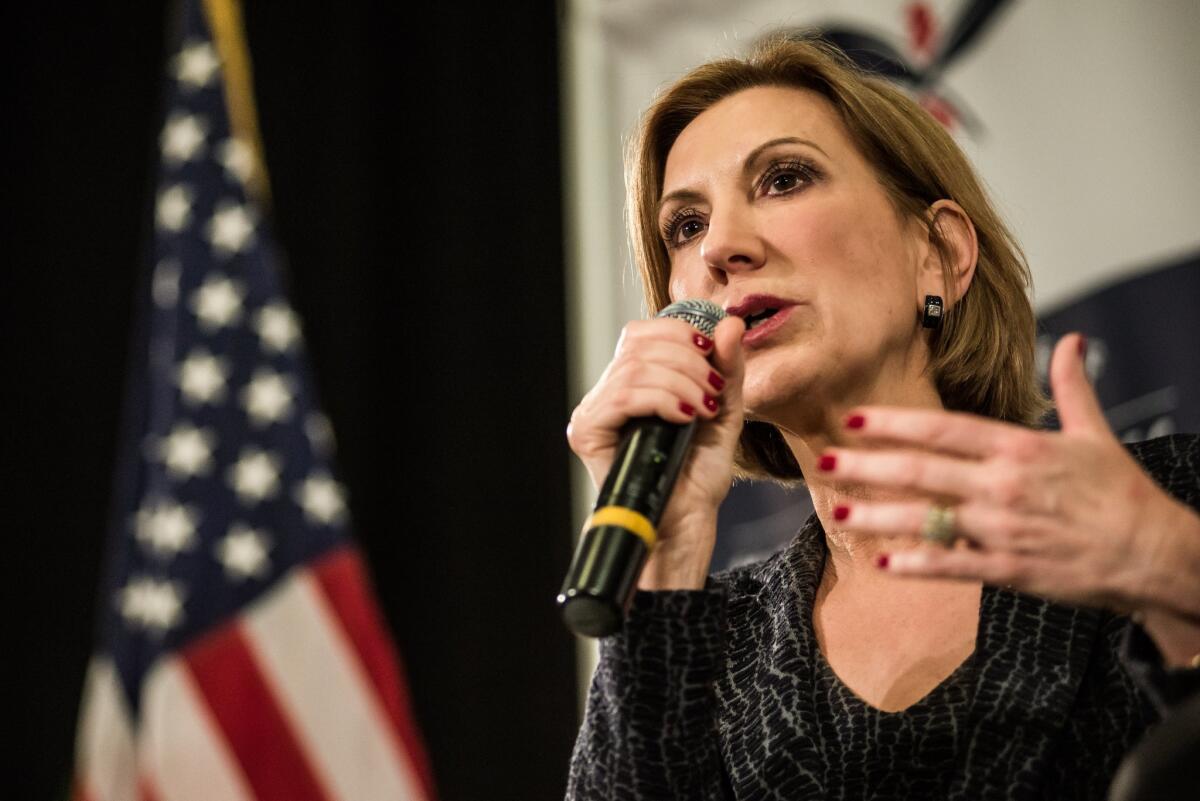
As she rises in the polls, Republican Carly Fiorina’s record has come under closer scrutiny. Some conservative critics have begun questioning the presidential hopeful’s fealty to their principles.
When Carly Fiorina was hired as Hewlett-Packard’s chief executive in 1999, she became the most powerful woman in the history of American business, and she was tasked with shaking up the venerable company.
On Wednesday night, Fiorina said she was facing “a bloated bureaucracy that cost too much and delivered too little" and she “had to make some tough calls at tough times.”
It’s an experience she’s tried to use as a springboard for a political career, but it’s also a source of controversy. Before mounting a presidential bid this year, she lost her campaign to replace U.S. Sen. Barbara Boxer, a California Democrat, in 2010.
Perhaps most problematic is Fiorina’s record of downsizing. Roughly 33,000 people were laid off from Hewlett-Packard during her tenure, and other jobs were outsourced.
Fiorina also championed an ill-fated merger with Compaq Computer, and Hewlett-Packard’s stock eventually lost more than half of its value. She was fired by the company’s board in 2005, and left with an exit package worth about $42 million.
While running for president, Fiorina has tried to soften her hard-nosed image, and she’s portrayed herself as the victim of a dysfunctional corporate board who resisted her attempts at modernization.
“When you challenge the status quo, you make enemies. I made a few,” she said during the last Republican presidential debate.
The debate is loud, but these candidates are quiet
Why Marco Rubio has mostly stopped voting in the Senate
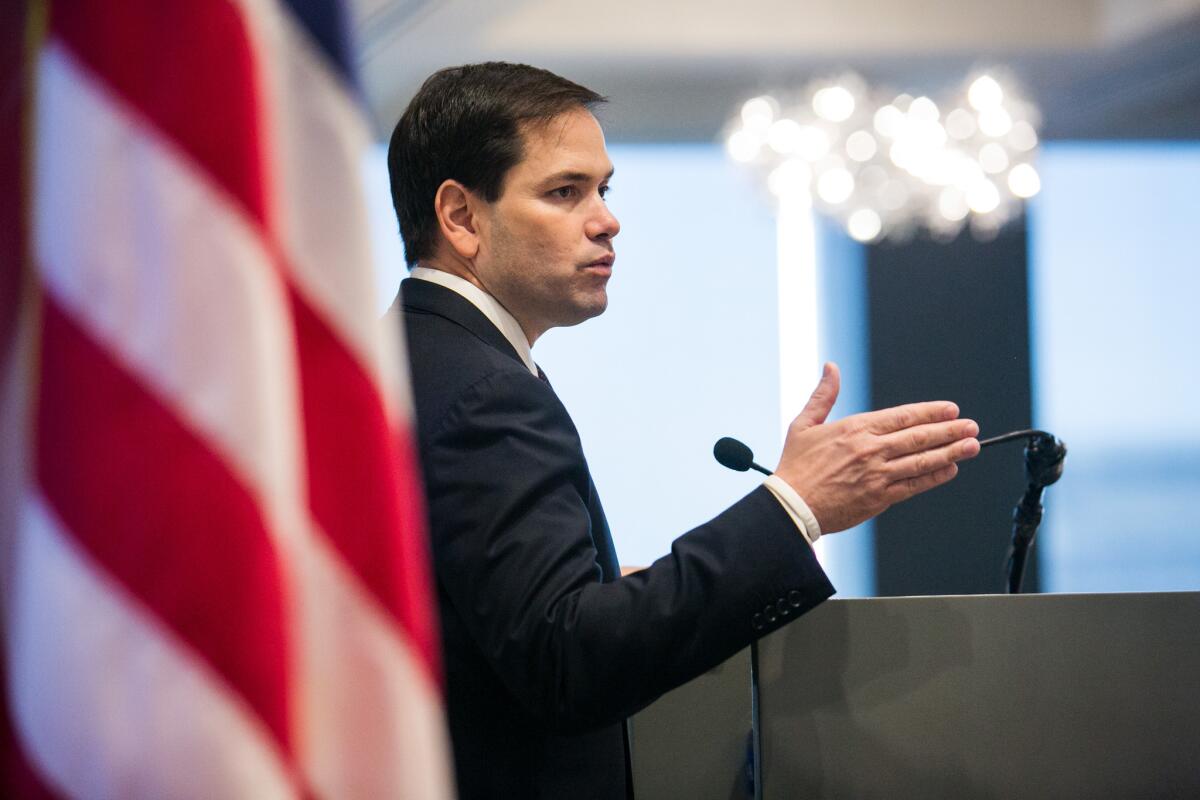
Republican presidential hopeful Sen. Marco Rubio (R-Fla.) speaks at an event organized by Town Hall Los Angeles on April 28.
Since declaring his run for the presidency in April, Marco Rubio has been a rare sight in the U.S. Senate, giving few speeches and missing nearly half the roll call votes on the floor.
For example, Rubio, a Florida Republican, missed a vote on a major defense spending bill this month so he could campaign in New Hampshire. He says he has given up on the Senate as a place to achieve change.
“I don’t know that ‘hate’ is the right word,” Rubio told the Washington Post this week about his distaste for the Senate, which he entered after winning a seat in 2010. “I’m frustrated.”
Rubio was questioned Wednesday about his missed votes and defended his actions as a choice he’d made to fight for the future of the nation.
“This country’s running out of time,” he said during the debate. “We can’t afford to have another four years like the last eight years.” He bemoaned the state of the economy and national security and said, “The time to act is now. The time to turn the page is now.”
Standing next to Rubio, former Florida Gov. Jeb Bush criticized the senator’s record.
“This was a six-year term. And you should be showing up for work,” Bush told him, citing a Florida newspaper editorial board's call for Rubio to resign.
Rubio is right that few senators can point to many victories these days, though it’s up to voters to weigh how best to respond. One of the few bills he sponsored that was actually signed by President Obama is relatively minor, the Girls Count Act of 2015, which included provisions to “encourage countries to support the rule of law and ensure girls and boys of all ages are able to fully participate in society, including by providing birth certifications and other official documentation.”
Rubio has distanced himself from his biggest achievement – a role in crafting a bipartisan immigration overhaul approved by the Senate in 2013. The bill was never brought up in the House, and Rubio stopped advocating for its passage as it became less popular among conservatives. He now says he favors a piecemeal approach to immigration.
The super PAC supporting Bush tweaked Rubio with a new Twitter account unveiled just before the debate, @ismarcoworking.
Talk of tax plans leads to a tussle
Biggest weakness? Republican candidates sound off
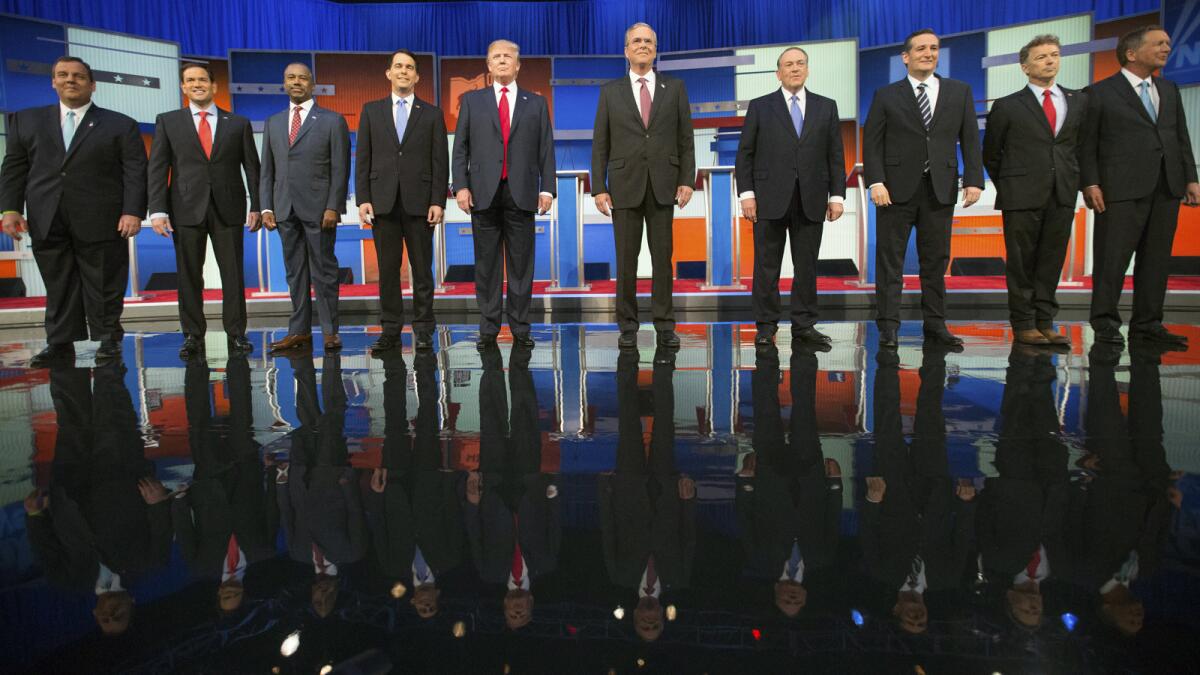
Republican presidential candidates take the stage in Cleveland before the prime-time debate: from left, Chris Christie, Marco Rubio, Ben Carson, Scott Walker, Donald Trump, Jeb Bush, Mike Huckabee, Ted Cruz, Rand Paul and John Kasich.
The first question of the CNBC Republican presidential debate Wednesday night was simple - what's your biggest weakness? Here's how they responded:
John Kasich : He didn’t answer the question.
Mike Huckabee : “I try to live by the rules.”
Jeb Bush : “I am by my nature impatient, and this is not an endeavor that rewards that.”
Marco Rubio : “I share a sense of optimism for today’s country.”
Donald Tump : “I’m too trusting, and when [people] let me down, I never forgive.”
Ben Carson : “Not really seeing myself in that position [of the presidency] until hundreds of thousands of people told me I needed to do it.”
Carly Fiorina : “After the last debate I was told I didn’t smile enough, but … these are very serious times.”
Ted Cruz : “I’m too agreeable. Easygoing. … I’m a fighter. I am passionate about what I believe."
Chris Christie : Doesn’t answer the question; attacks the Democratic candidates.
Rand Pau l: Doesn’t answer the question; talks about the federal budget deficit.
Your quick guide to top Republican candidates' tax plans
You can sum up the tax plans from leading Republican presidential candidates with two words – simplify and reduce.
Their proposals would simplify the tax code by slashing the number of income brackets and then lower rates to reduce tax burdens. Experts say the plans would probably cost the country trillions of dollars in revenue over a decade, and Democrats say they disproportionately benefit wealthy Americans.
CNBC promised a debate focused on economic issues, and the debate started out with tough questions for the candidates about their tax plans. The moderators grilled Donald Trump and Ben Carson about whether their ideas would lead to a loss of government revenue, while the two candidates insisted that they would make the math work.
Here’s a look at how some Republican candidates want to handle taxes:
Carson , the retired neurosurgeon who is leading in many polls, has perhaps the most radical idea, based on the religious practice of tithing income to the church. Everyone would pay roughly 15% in taxes, regardless of how much money they earned.
Trump , the New York real estate magnate, would leave the country with four federal income tax brackets, down from the current seven. The highest tax rate would be cut from 39.6% to 25%, and the corporate rate would go from 35% to 15%. Couples who earn less than $50,000 would not pay any income tax.
Jeb Bush , the former Florida governor, would cut the number of tax brackets to three, and reduce the top rate to 28%. Corporate taxes would drop to 20%. He’d also expand the earned income tax credit for poor Americans and eliminate the estate tax.
Marco Rubio , a U.S. senator from Florida, has pushed his idea for a larger tax credit for families with children. He’d also reduce the tax code to just two brackets, with the top rate being 35% and the low rate rising to 15%. The plan would also eliminate taxes on capital gains.
Dressing for the debate
At least two candidates are wearing something special.
Early debate offers some engaging moments
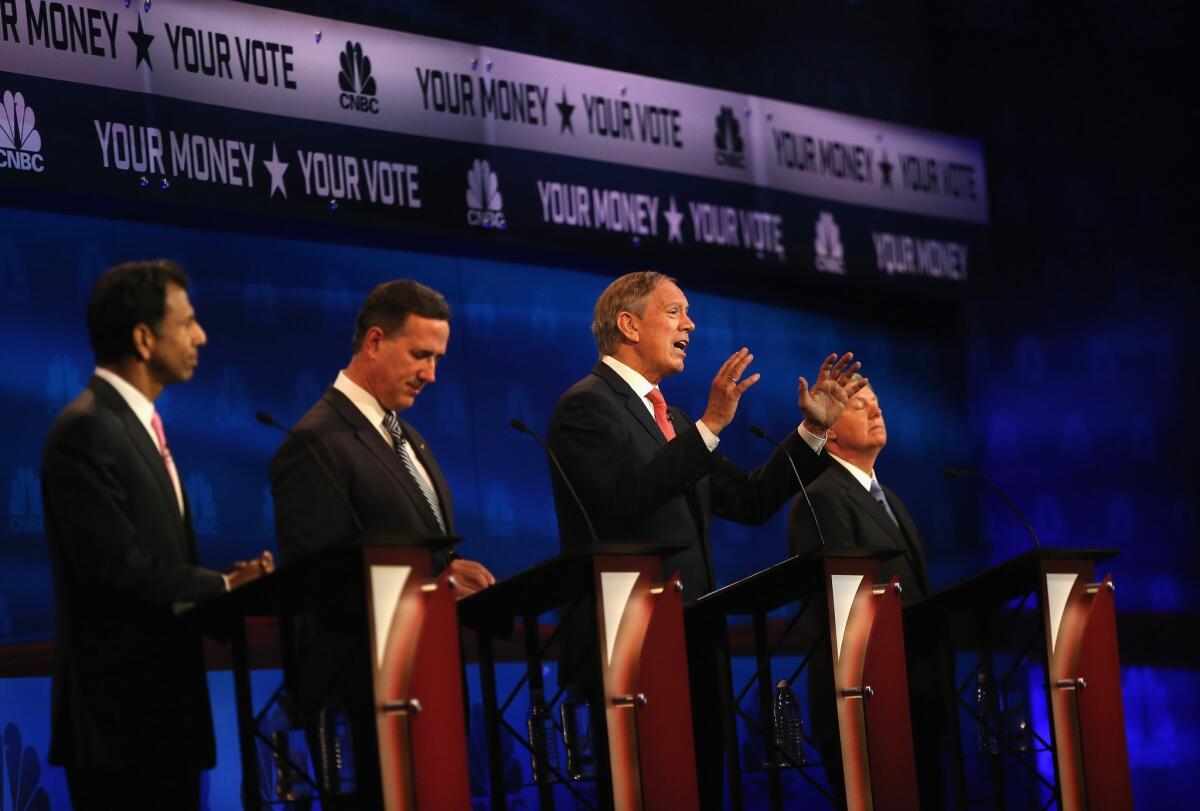
BOULDER, CO - OCTOBER 28: Presidential candidates Louisiana Governor Bobby Jindal (L-R), Rick Santorum, George Pataki, and Sen. Lindsey Graham (R-SC) take part in the CNBC Republican Presidential Debate at University of Colorado’s Coors Events Center October 28, 2015 in Boulder, Colorado. Fourteen Republican presidential candidates are participating in the third set of Republican presidential debates. (Photo by Justin Sullivan/Getty Images) ** OUTS - ELSENT, FPG, CM - OUTS * NM, PH, VA if sourced by CT, LA or MoD **
There was a surprisingly substantive and unexpectedly engaging back-and-forth discussion between the four undercard candidates in Boulder, Colo., on Wednesday night. But will it make any difference in the race?
Probably not.
Despite some memorable lines from South Carolina Sen. Lindsey Graham, and even from dark-horse contender George Pataki, the former governor of New York, time appears to running out on the candidates at the bottom of the pack. None are poised to break into double digits in the polls the way Carly Fiorina did after a strong performance in the first undercard event two months ago.
Yet the “happy hour” debate was notable for a few things.
Both Pataki and Graham were sharply critical of the GOP’s position on climate change. They warned that global warming is real and that Republicans need to deal with it. Graham took aim at a favorite talking point by Republicans, who are fond of saying they are not scientists and thus not qualified to weigh in on the issue. He said he talks to scientists, and more than 90% of them believe global warming is real and that is enough for him.
Pataki embraced an agenda more commonly associated with Democrats, touting the virtues of renewable fuels and solar panels.
“Too often we question science that everyone accepts,” Pataki said, adding that skepticism of vaccines among some GOP candidates “is ridiculous in the 21st century.”
That global warming is real, Pataki said, “is uncontroverted.”
Graham also used the debate to hammer on his favorite theme of national security, repeatedly saying he had the experience to strengthen America’s standing. He pointed to the provocations of Russia’s Vladimir Putin, saying that would not be happening if someone like Ronald Reagan – or Lindsey Graham – were in charge. He vowed that China would be brought to heel under a Graham presidency.
“So to the Chinese, when it comes to dealing with me, you've got a clenched fist or an open hand,” he said. “You pick. The party's over, to all the dictators. Make me commander in chief and this crap stops.”
Former Sen. Rick Santorum, meanwhile, found himself overshadowed for much of the event. When he thanked Colorado, where the debate was taking place, for supporting him in the 2012 primary, it seemed like that victory was 100 years in the past. He also irked many conservatives by making a full-throated endorsement of the Export-Import bank, a lending institution that many Republicans would like to see abolished.
“Every major competitor for the United States' manufacturing dollar has one of those banks,” he said. “So in order to have a level playing field, which is what conservatives talk about all the time -- level playing field -- then we have to have export financing.” The comments did not go over well with the Republican base, if Twitter is any indication.
Louisiana Gov. Bobby Jindal was also on the stage, and he had a lot to say. But much of it was in defense of his record in that state, as Jindal found himself forced to respond to a panel of very skeptical CNBC moderators who kept returning to the budget mess that has consumed the state government during his tenure.
The debate was focused narrowly on money and business issues, and one that arose was the potential consolidation of several large beer manufacturers, including Colorado-based Coors. Candidate were asked whether they were troubled by one beverage company having “too much power” over consumers.
They weren’t.
But the question made for a good lead-in to some drinking anecdotes.
Santorum noted that, ever grateful for Colorado’s support in the last election, he drinks a lot of Coors.
Graham talked about the difficulties growing up in the back of the bar his family owned. “I know beer,” he said.
Donald Trump, iPhone salesman
During a lighthearted question about phone apps, Lindsey Graham joked that the only reason he has an iPhone is because of Donald Trump.
That was a reference to the feud between presidential candidates. Graham had called Trump a "jackass," and Trump responded by calling Graham "stiff" and giving out his cellphone number.
Graham ended up ditching the number, but not before milking the episode in an attempt to draw more attention to his struggling campaign.
4 takeaways from the second-tier debate
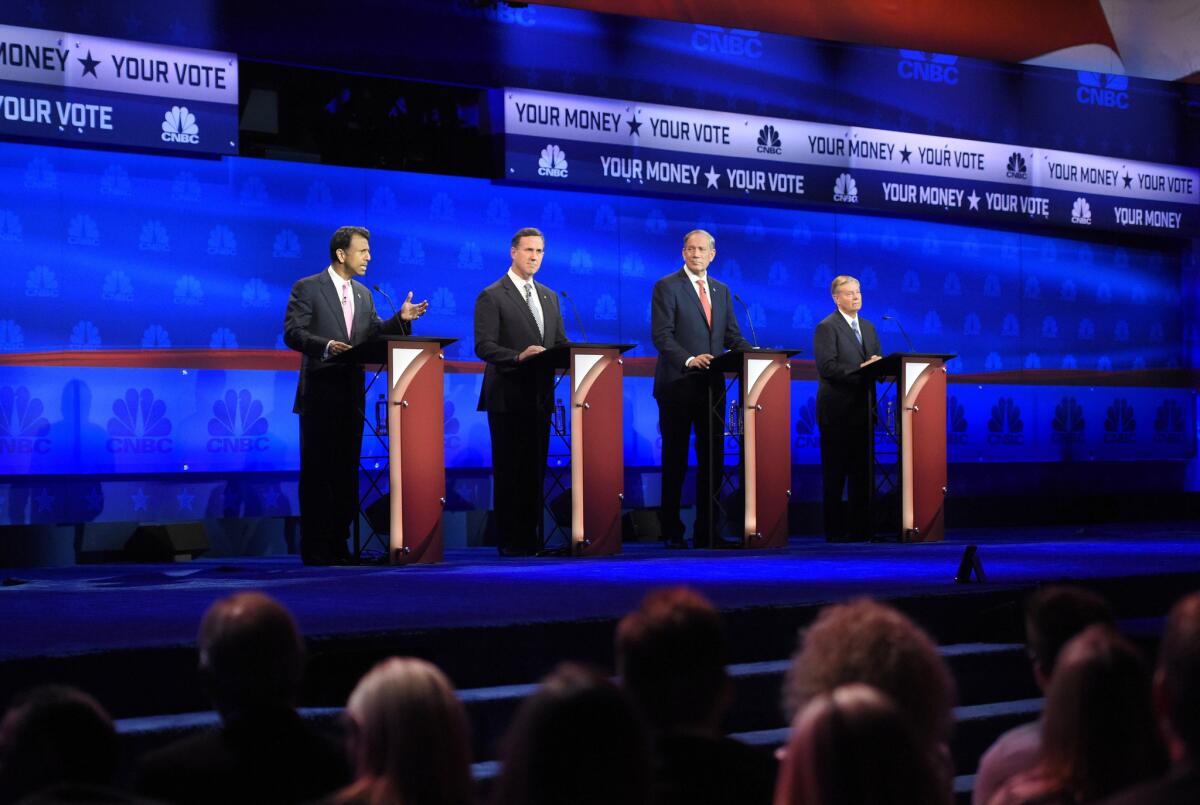
Republican presidential candidates, from left, Louisiana Gov. Bobby Jindal, former Sen. Rick Santorum of Pennsylvania, former New York Gov. George Pataki and South Carolina Sen. Lindsey Graham take the stage during the second-tier Republican presidential debate Wednesday in Boulder, Colo.
Wednesday’s undercard debate had no real breakthrough moments, mostly demonstrating why these candidates have failed to win a spot on the crowded main stage. Takeaways from the debate featuring Rick Santorum, the former Pennsylvania senator; Louisiana Gov. Bobby Jindal; George Pataki, the former New York governor; and South Carolina Sen. Lindsey Graham:
> None of these candidates is likely to make it to the main stage.
Carly Fiorina did it following her strong performance in the first undercard debate in August. But these candidates have been competing for months, yet they all generally draw 0-1% support in polls. Graham performed well in the previous debate, but that was not enough to boost his low poll numbers. No one on stage Wednesday did much that seems likely to alter that dynamic.
> Graham is intent on keeping his focus on national security, fulfilling his mandate as a message candidate with little chance of winning.
Question one was about a budget deal. Graham’s answer: “Barack Obama is an incompetent commander-in-chief.”
Later, he was asked about cybersecurity: “We’re being walked all over because the commander-in-chief is being weak in the eyes of our enemy.”
And what about corporate responsibility? Graham had a pivot there too, arguing that the nation owed a debt to its soldiers “a commander-in-chief who knows what the hell they’re doing.”
> Bucking GOP orthodoxy is politically costly.
Graham and Pataki both stood up for climate change science and backed government efforts to curb global warming.
“One of the things that troubles me about the Republican Party is, too often, we question science that everyone accepts,” Pataki said.
The latest average of polls on Real Clear Politics has Pataki at 0.2%. You are not likely to hear that statement made on the main stage tonight.
> Gov. Bobby Jindal is trying hardest among the second-tier candidates to prove his tea party mettle.
Once considered an up-in-comer in his party, Jindal has struggled to break through, despite his platform as a sitting governor with similar views to many in the GOP base.
He issued dire warnings that the nation was turning toward socialism and argued that Republicans in Washington have been unwilling to take on Obama.
“We are going the way of Europe,” he said at one point. “The left is trying to change the American dream into the European nightmare.”
A moment later, he threw in the GOP Congress as well: “Here’s the problem: the Republicans never want to fight.” The complaint is a fairly common one on conservative radio. But it’s worth remembering that the fight has actually consumed Washington for most of Obama’s presidency, leading to a two-week shutdown in 2013.
Get ready for another round of bingo!
22 minutes and counting until the main event. Will anyone name-drop Vladimir Putin or repeat a promise to defund Planned Parenthood? With two hours and 10 candidates, you're bound to get bingo in no time. Play along with us here.
Sanders: End the federal ban on marijuana
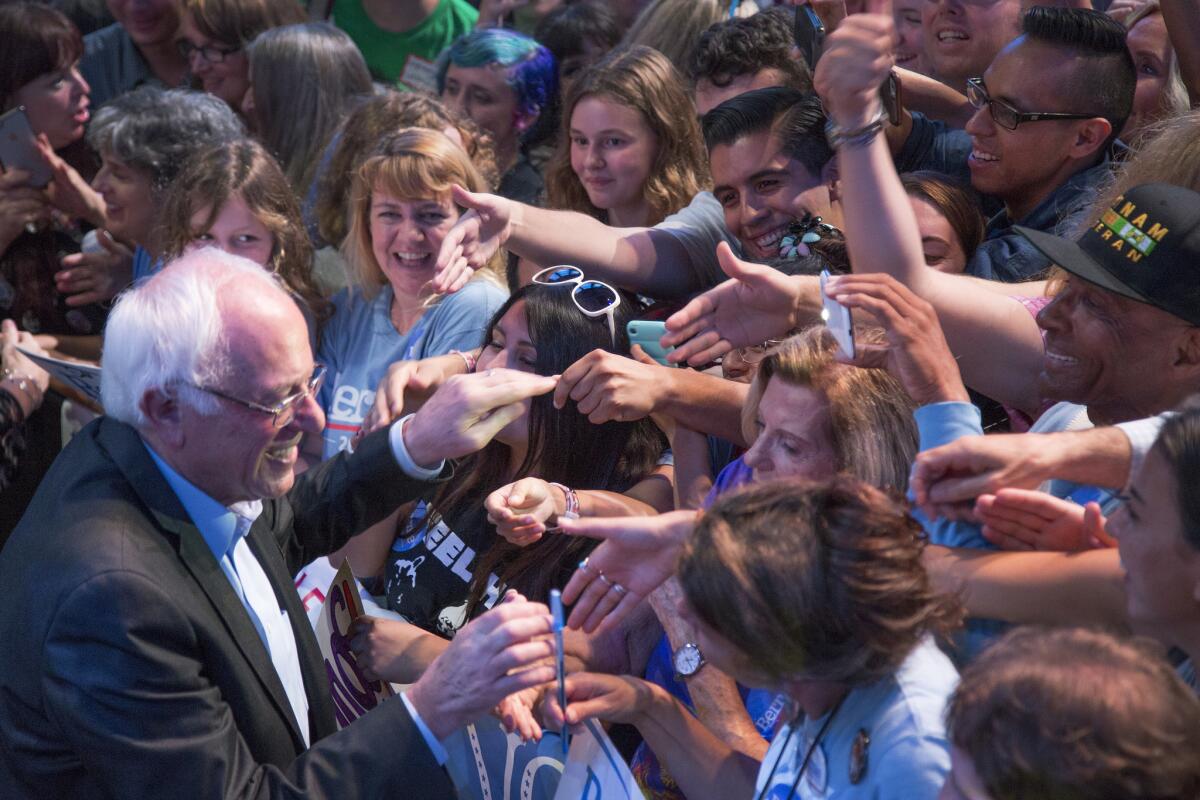
Democratic presidential candidate Bernie Sanders greets supporters at a campaign fundraising reception at the Avalon Hollywood nightclub on Oct. 14.
Sen. Bernie Sanders called for an end to the federal ban on marijuana Wednesday, embracing a cause that advocates argue could draw young voters to the polls.
Sanders made his proposal during a speech to 250 online student meetings, according to a statement from his campaign. He cited changing marijuana laws as a significant step toward reform of the criminal justice system.
"Too many Americans have seen their lives destroyed because they have criminal records as a result of marijuana use," Sanders said. "That's wrong."
Sanders' proposal would not directly alter the vast majority of those criminal prosecutions, most of which take place under state law.
But by taking marijuana off the list of drugs considered highly dangerous under federal law, his plan would open the way for states that want to legalize. So far, four states -- Washington, Oregon, Colorado and Alaska -- and the District of Columbia have legalized recreational use of marjijuana, and 23 allow it to be used for medical purposes.
Currently, even in states that allow marijuana to be legally sold and consumed, users and sellers can be subject to federal prosecution. Legal dispensaries have faced continued problems using banks because of the potential for violating federal law.
Changing federal law would remove those barriers to legalization. Measures to change marijuana's status under federal law have been gaining support in Congress, but have not gained a majority so far.
Sanders has drawn considerable support from voters younger than 30 in his race against Hillary Rodham Clinton for the Democratic nomination. She has said she wants to see how Colorado's experiment with legalization works before taking a position on the issue.
Lindsey Graham had a strong debate performance - but it probably won't matter
South Carolina Sen. Lindsey Graham, known for his self-deprecating sense of humor and quick wit, received some of the loudest laughter and applause during Wednesday’s debate for the lower-tier GOP presidential candidates.
But if past is prologue, it’s unlikely to make a difference in Graham’s standings in the race, in which Republican voters’ frustration with Washington is fueling the popularity of outsiders such as Donald Trump and Ben Carson.
During the hourlong debate in Boulder, Colo., Graham received some of the most boisterous responses when he described the Democrats seeking their party’s nomination for president.
Front-runner Hillary Rodham Clinton thought she was “flat broke” after spending eight years in the White House, and her main rival, Vermont Sen. Bernie Sanders, "went to the Soviet Union on his honeymoon and I don't think he ever came back!" Graham said.
"If we don't beat these people, who the hell are we going to beat? Let's solve problems," Graham said.
He also had a memorable moment when he warned the Chinese that they could pick between his “clenched fist or an open hand” and held his up to demonstrate.
Graham also poked fun at his intelligence and his pronounced Southern drawl while defending his position that the 11 million people in this country illegally should not be deported unless they are felons.
“Those who stay will have to learn our language to stay. Because I don't speak it well, but look how far I've come," Graham said.
Graham’s positions on issues such as immigration, climate change and the budget deal approved by the House on Wednesday prompted a moderator to question whether he was in “the wrong party’s debate.”
Graham countered that he was simply interested in solving the nation’s problems.
The question, however, pointed to why Graham is struggling to rise above the single digits in polling among the 15-candidate GOP field. He has spent 20 years representing South Carolina in the House and the Senate and is known for working across the aisle. In an election year in which many GOP voters are motivated by anger at federal officeholders who they see as having become part of the system, such resume credentials are anathema.
What 3 apps do these candidates have on their phones?
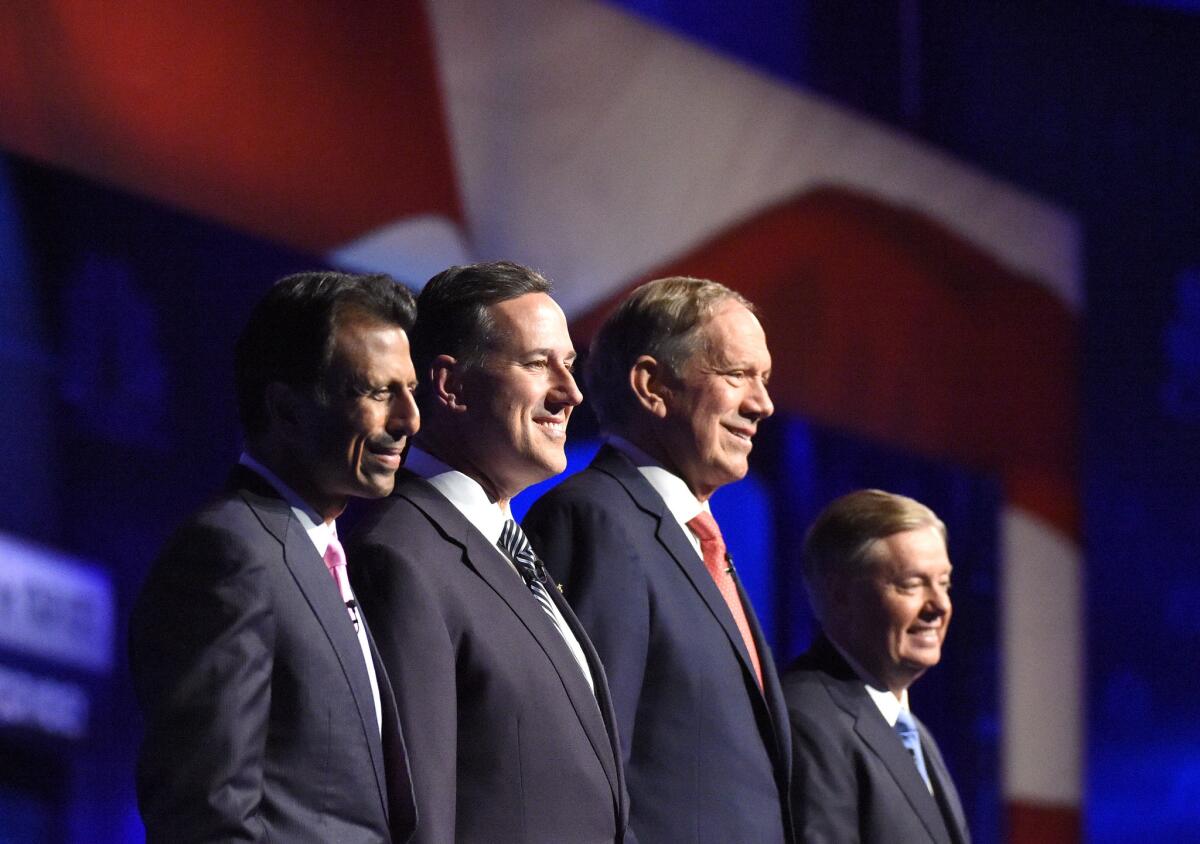
Republican presidential candidates Bobby Jindal, left, Rick Santorum, George Pataki and Lindsey Graham take the stage during the CNBC Republican Presidential Debate.
Gov. Bobby Jindal: "I may be the last American without an iPhone." Still has a Blackberry, but uses it to keep up with news and "the Internet."
Former Sen. Rick Santorum: MLB and NHL.
Former Gov. George Pataki: Uber ("I used to have a driver") and Twitter.
Sen. Lindsey Graham: Fox News. "The only reason I have an iPhone is because I gave my number to Donald Trump."
If you aren't watching, here's what you missed
Pataki takes on his party over climate change and vaccinations
It's very California of him.
What's Pataki's aim?
A true 'happy hour' debate question
Debaters were asked their thoughts on Coors and the possibility of it becoming part of a beer monopoly.
15 minutes left to make a sound
Early shots fired at Democrats
Republican candidates wasted no time leveling blows at Democrats early in the one-hour debate.
Sen. Lindsey Graham called President Obama an "incompetent commander in chief." Louisiana Gov. Bobby Jindal joined in.
Graham stays on message with focus on national security
Right off the bat, South Carolina Sen. Lindsey Graham seems determined to hit his talking points on national security. "Without national security, there is no economic security," Graham said in his first words of the undercard debate.
Asked about the budget deal that was recently reached, Graham quickly pivoted.
The Happy Hour debate
The marquee Republican debate on Wednesday night will be preceded by what has come to be known as the “happy hour” debate. At 3 p.m., the four weakest candidates of the crowded Republican field take the stage to argue among themselves.
The lineup includes South Carolina Sen. Lindsey Graham, Louisiana Gov. Bobby Jindal, former New York Gov. George Pataki and former Pennsylvania Sen. Rick Santorum.
Don’t be too quick to discount the early event. It was in the first such happy hour debate where a breakout performance by Carly Fiorina catapulted her from also-ran status to a serious contender for the nomination. Ever since, she has been polling strongly enough to participate on the main stage, where she will be tonight.
Could George Pataki be next? Stranger things have happened in this race.
Martin O'Malley walks into the spotlight, which is open for a moment
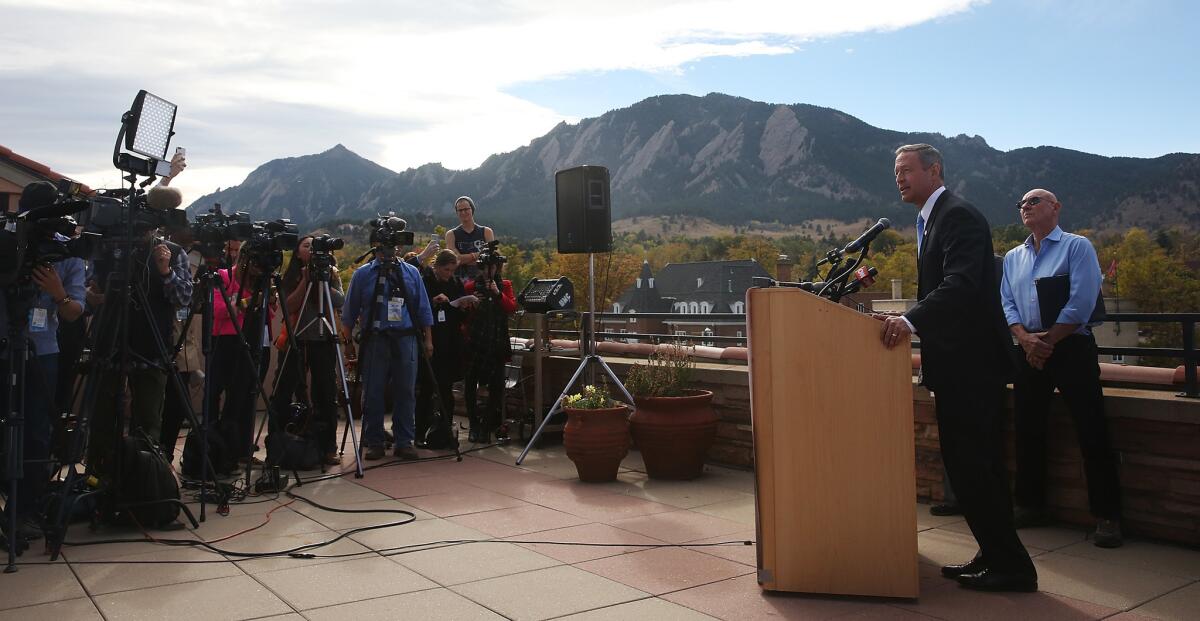
BOULDER, CO - OCTOBER 28: Democratic presidential candidate Martin O’Malley speaks about the need for gun safety reform on the campus of University of Colorado, Boulder hours before a Republican presidential debate on October 28, 2015 in Boulder, Colorado. Fourteen Republican presidential candidates are participating in the third set of Republican presidential debates. (Photo by Andrew Burton/Getty Images) ** OUTS - ELSENT, FPG, CM - OUTS * NM, PH, VA if sourced by CT, LA or MoD **
With a captive audience – 10 zillion political reporters with hours to kill before the start of the Republican presidential debate – Democratic hopeful Martin O’Malley seized the moment Wednesday by crashing the GOP gabfest and taking a poke at his party rivals on guns.
“Once Secretary Clinton and Sen. Sanders get done bickering about shouting and who’s sexist and who’s not, I hope they’ll come back to the main issue here, which is that we need common-sense gun legislation in our country,” O’Malley said at an al fresco news conference on the University of Colorado campus.
The back story: In an effort to shore up a perceived political weakness, Vermont Sen. Bernie Sanders – a less than down-the-line supporter of gun control, began telling audiences it was time to stop shouting about the issue and find common ground.
Former Secretary of State Hillary Rodham Clinton, taking personal umbrage where it was not necessarily intended, responded by saying she would not stop “shouting” or calling for tougher gun laws. Then, going a step further at a big Democratic dinner last weekend in Iowa, she suggested Sanders had been sexist in his statement.
“I haven’t been shouting,” Clinton said, “but sometimes when a woman speaks out, some people think it’s shouting."
There is, of course, another factor at work.
O’Malley, the former governor of Maryland, is a mere speck in Democratic opinion polls, hence the desire to grab any slice of attention at all possible. In effect, he brought Muhammad to the mountain – or in O’Malley’s case, the Flatirons, which provided a stunning autumnal backdrop for his rooftop press availability.
And it worked. More than a dozen TV cameras and half a dozen still photographers showed up along with a respectable contingent of reporters, who then scurried back to make the GOP undercard debate between the handful of Republicans dwelling, like O’Malley, in the netherworld of election polls.
Trump focused on polls heading into debate
Martin O'Malley seeks attention in Boulder
McManus: GOP has two contests going on
We’re not really watching a single campaign for the Republican nomination.
Instead, we’re watching two parallel contests to determine who the finalists will be.
One contest is among mainstream conservatives, while the other is among insurgent conservatives . . .
Ben Carson arrives for tonight's debate in Colorado
Trump, Bush and Rubio in debate: Seizing the crisis?
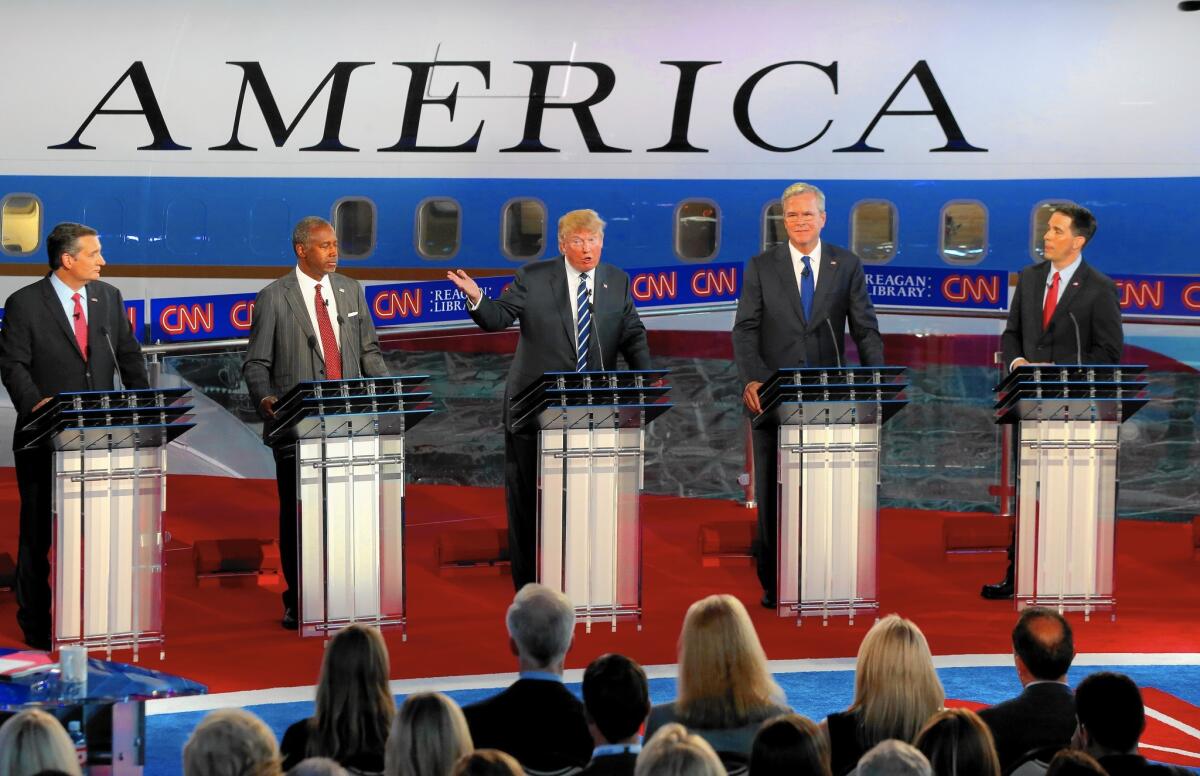
Republican candidates in their debate last month at the Reagan Presidential Library.
The trick with a crisis, as a political mastermind once put it, is never to let one go to waste. Several Republican candidates have a chance to do that right now.
Tonight’s GOP debate will showcase whether – and how – they plan to do so.
Jeb Bush is clearly aware of the need to correct course in his campaign, as he slides in the polls while fighting to be the dominant “establishment” Republican.
In an effort to correct course, he cut his campaign staff payroll by 40% last week and has pledged that he will change strategy to be more “lean and mean.”
His strategy, as Mike Memoli and Mark Barabak explain, is to pursue a more wonky discourse.
But what about Bush’s biggest rival for the role of regular Republican?
Rubio’s crisis-in-the-making centers on his absenteeism from the Senate floor. The poor attendance record inspired an influential Florida paper this week to complain that he’s “MIA from his J-O-B.”
Rubio’s plan, as past performance indicates, is to meet Bush in the weeds and try to win the discussion with his fluency on policy matters. Rich Republican funders will be paying close attention to that competition.
As for the crisis facing Ted Cruz, his biggest problems are named “Donald Trump” and “Ben Carson.” Remember how Cruz was supposed to be the leading voice for change?
As the latest polls show, Trump and Carson are cornering that market.
Or maybe that should be “Carson and Trump,” given the doctor’s surge against the real estate tycoon in those recent polls.
Trump’s take on his first crisis has been to laugh, tease and cajole, as he modeled in Sioux City, Iowa, on Tuesday.
“Iowa, will you get your numbers up, please?” Trump urged one crowd. “I promise you I will do such a good job.”
A humbler, gentler Trump? Let the crisis management begin.
Federal control of public lands emerges as GOP primary issue
At least 10 states want to take back federally managed land and run it themselves, a move that would open the way for more hunting and fishing as well as oil and coal mining.
Rand Paul and Ted Cruz are among those who back the idea, but other Republican presidential candidates have also signaled their disdain for restrictive federal policies on public lands in the West.
My colleague William Yardley explains in today's paper why some Republicans would like to see their candidates address the question. Utah state lawmaker Ken Ivory tells Yardley the issue is a matter of fairness.
"Why shouldn't the federal government have to treat all the states equally?" asks Ivory, a Republican who has been pitching his plan around the country through an advocacy group he founded, the American Lands Council.
"If they were really serious about a solution big enough to solve so many of the major issues that face our nation — economic, environmental, national security, energy — this is the only solution,” he says.
First Trump target of debate day: poll reporting
Bill Daley warns Hillary Clinton: Don't get pulled too far left
A group of prominent centrist Democrats issued a dire warning against the party’s drift toward populism on Wednesday, arguing that a message of blaming the wealthy has led to historic losses in state legislatures and Congress over the past three elections.
“We’re in a complete free-fall beneath the presidential level,” said Jonathan Cowan, president of Third Way, a think tank urging the party toward a pro-growth agenda.
Third Way’s report recommends a number of steps it says will bring in more voters. Its recommendations include a push for a smaller minimum wage hike than some populists have proposed, adjusted by region and based on economic differences.
The report also offers suggestions its authors say will help the party pave a more future-oriented strategy, including a “skills revolution” that gives more access to quality pre-K.
The report critiques positions embraced by Democratic front-runner Hillary Rodham Clinton, an opponent of the Pacific trade deal. She also has called for a greater crackdown on Wall Street in response to core Democrats’ rallying around the economic messages of Sens. Bernie Sanders and Elizabeth Warren.
“The Democratic Party cannot have a debate about the past,” said Bill Daley, a former chief of staff for President Obama. The “economic populism,” he said, is focused largely on the concept of “blame — [to] make somebody a victim, blame somebody who’s been successful, blame business, or blame the government.”
Daley warned Clinton against getting pulled too far left, pointing to former Massachusetts Gov. Mitt Romney’s rightward move during the 2012 Republican primary as a culprit in his loss to Obama.
“We all get the fact that you’ve got to win a primary to get the nomination,” he said in a morning panel discussion. “But as we all know, because we’ve seen it, there is some sort of . . . line there, whether you are on the right or the left. If you cross that in the primary process, it is very difficult to get back to where the general election is, and that is in the middle.”
Third Way, which has backing from many prominent Wall Street Democrats, has long been a leading critic of the party’s populist wing. Progressive groups argue that the polling is on their side and that policies such as expanded Social Security and across-the-board minimum wage hikes will help Democrats win elections.
The panelists said they did not believe Clinton had passed the line that would lead her to lose a general election.
Republican debate: Expect either Trump fireworks or a policy wonk's dream
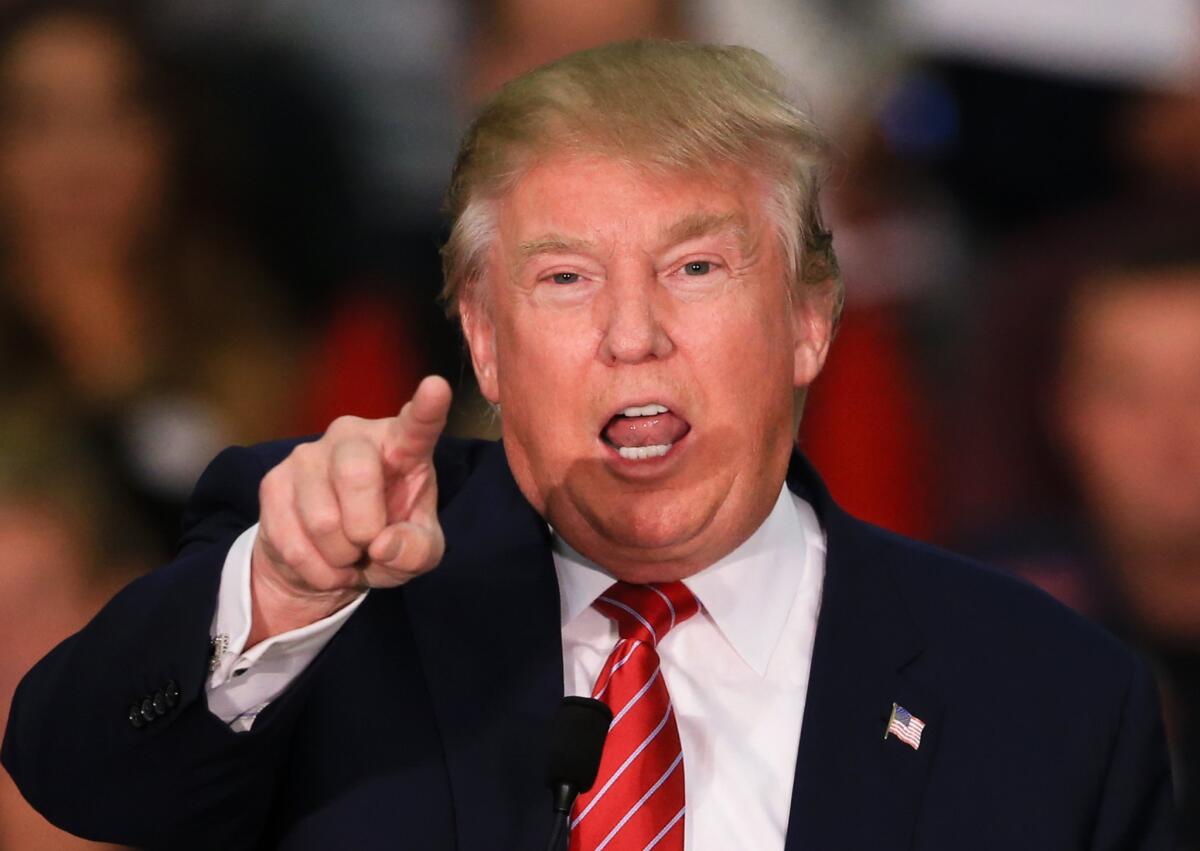
Republican presidential candidate Donald Trump speaks at an event in Sioux City, Iowa, on Oct. 27.
Confronted with a new poll showing Ben Carson leading him in Iowa, Donald Trump offers this stunned analysis: “I don’t get it.”
But the real estate tycoon is far from silent when dumbfounded. He’ll be out to defend his front-runner status at tonight’s Republican debate, which probably sets us up for a show with fireworks.
At the same time, though, other candidates are preparing for a policy-oriented discussion on the business-focused CNBC.
High priorities in the prep sessions this week were unemployment data, President Obama’s proposed Pacific trade deal and Federal Reserve policy. Several candidates are hoping to go deep into the policy weeds.
From A to Z, Michael A. Memoli and Mark Z. Barabak spell it out for you here . . .
It's debate day -- know the GOP candidates and the issues

Republican presidential candidates take the stage in Cleveland before the prime-time debate: from left, Chris Christie, Marco Rubio, Ben Carson, Scott Walker, Donald Trump, Jeb Bush, Mike Huckabee, Ted Cruz, Rand Paul and John Kasich.
Republican presidential hopefuls are in Boulder, Colo., on Wednesday for the third presidential debate of the 2016 election cycle.
Donald Trump and Ben Carson are at the top of the crowded field vying for the party's nomination.
Read about the candidates in this Los Angeles Times graphic.
By the numbers
Get the L.A. Times Politics newsletter
Deeply reported insights into legislation, politics and policy from Sacramento, Washington and beyond. In your inbox three times per week.
You may occasionally receive promotional content from the Los Angeles Times.

